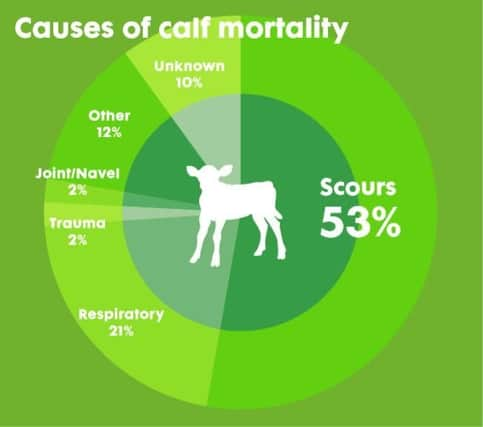Helpful tips to reduce the impact of calf scour


Calf scour can either be caused by infectious organisms, incorrect feeding practices, or a combination of the two. Infectious organisms that cause calf scour are bacteria (such as E.coli and Salmonella), viruses (such as rotavirus and coronavirus) and parasites (such as cryptosporidium and coccidia). Incorrect feeding practices, such as feeding a poor quality calf milk replacer, feeding at an incorrect temperature and feeding at irregular times, can directly cause calf scour and also make the calf more vulnerable to infectious organisms.
Scouring calves can lose large volumes of fluid resulting in dehydration, and also lose electrolytes resulting in acidosis. It is this dehydration, rather than the infectious organism itself, that causes calf deaths. Therefore, it is important to spot signs of dehydration early – such as a dry nose, drooped ears, lack of appetite and sunken eyes.
Advertisement
Hide AdAdvertisement
Hide AdTreatment for dehydration involves giving electrolytes however, as electrolytes do not meet the calf’s energy requirements for growth or immune function, it is best to feed a good quality electrolyte twice a day, between the normal milk replacer feeds.
Prevention of scour
To support the calf’s immune system, ensure they receive four litres of clean, good quality colostrum as soon as possible after birth. Do not worry if they do not seem as hungry at the next feed time, they will have received ‘what they need, when they need it’.
Use a high quality calf milk replacer fed at the correct temperature of 40oC, at regular intervals, two or three times a day.
A good quality calf milk replacer will supply essential nutrients (such as amino acids, minerals and vitamins) to support growth and the immune system. Calf milk replacers that have the LifeStart logo are formulated to high scientific standards and have these essential nutrients included. They also contain higher levels of medium chain fatty acids, which create an unsuitable environment for the growth of many infectious bacteria, along with a yeast cell wall fraction to maintain gut health.
Advertisement
Hide AdAdvertisement
Hide AdAs calves with scour can spread large amounts of infectious organisms, it is crucial to separate sick calves from healthy calves. Although relatively hard work, an ‘all-in-all-out’ system with disinfection in between really helps keep levels of infectious organisms low.
Your vet can send a scour sample to the lab to find the cause of scour so that the best control methods can be put into place. With rotavirus or coronavirus, your vet can recommend vaccinations to give your cows before they calve to help reduce the risk of these scours.
For control of scour caused by cryptosporidium, your vet may recommend treating calves with halofuginone and give advice on the appropriate disinfectant. In addition, calf milk replacers have the option of having Pulmo+ included, a natural complementary feed designed for the nutritional maintenance of a healthy intestinal tract. Pulmo+ contains the essential oil EMX, which has been shown to interact with cryptosporidia and have an anti-inflammatory type action.
In summary, find out the cause of the scour so as to choose the best course of action. Feeding four litres of colostrum and a higher plane of nutrition of a good LifeStart-quality calf milk replacer will help maintain a healthy immune system. Pulmo+ can be added into calf milk replacers as this contains EMX for the nutritional maintenance of a healthy digestive tract.